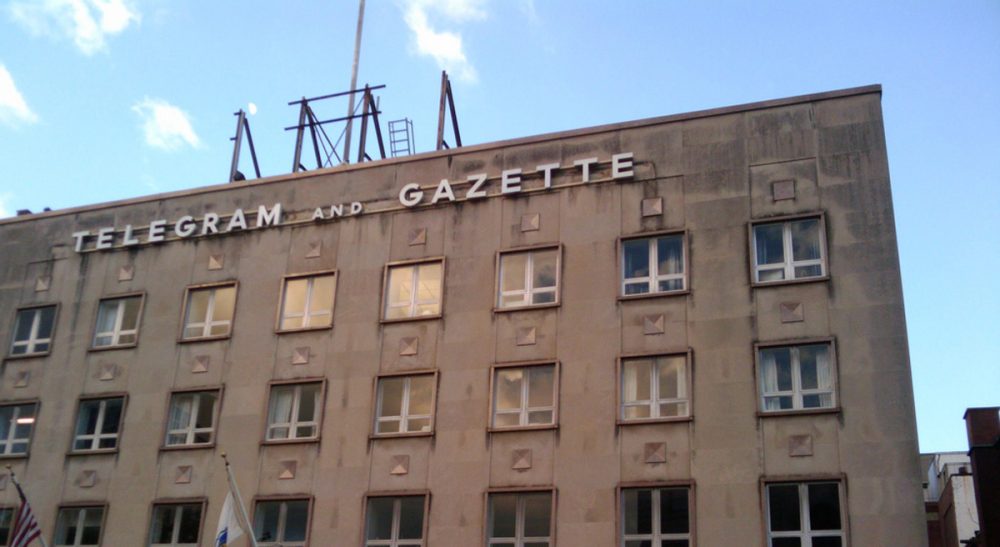Advertisement
Why The Sale Of The Worcester Telegram & Gazette Matters

When Florida-based Halifax Media Group took control of the Worcester Telegram & Gazette on Monday, Halifax CEO (and major investor) Michael Redding promptly laid off a fifth of the newsroom staff. First things first, after all.
In a press release gussied it up to look like a news story, Redding said, “This will not impact our news coverage in any way.”
This is like your favorite local restaurant laying off a fifth of its waitstaff and reassuring you service won’t be affected in the least.
Of course the layoffs at the Telegram will “impact” the paper’s news coverage significantly and in the most basic way: There will be far less quality local news in the Worcester Telegram.
This is like your favorite local restaurant laying off a fifth of its waitstaff and reassuring you service won’t be affected in the least.
As Jon Chesto of the Boston Business Journal reported Monday, that means about 20 of the paper’s 80 news employees were laid off — although the exact number remains unclear. That’s a significant loss in the number of professionals who gather, write, edit and package the news for the Telegram and its website.
All day Monday, Telegram staffers were tweeting details of the layoffs using the hashtag #SupporttheTelegramStaff, and from those tweets we have a partial list of the newsroom workers let go by Halifax. The Telegram’s editor, Leah Lamson, who had been at the paper for 36 years, resigned for “personal and professional reasons.”
Much has been made over the past three years of high-profile wealthy people buying major metropolitan dailies: Amazon’s Jeff Bezos bought the Washington Post, greeting card company owner Aaron Kushner bought the Orange County Register and John Henry bought the Boston Globe (and the Worcester Telegram, which he sold to Halifax). But there is another kind of ownership buying up financially struggling newspapers these days. Let’s call them Consolidators.
Advertisement
The strategy of the Consolidators is to buy up small-city newspapers, fold them into a large corporate entity, cut staff and merge operations of the newspapers (as Halifax did when it bought The New York Times Regional Media Group). The most famous Consolidator is Warren Buffett, whose Berkshire Hathaway owns 30 daily newspapers.
The end game of the Consolidators is not yet clear. Do they believe that with deep enough cuts and significant consolidation of back-shop and editorial functions, there is money to be made in small-city newspapers that are the only cost-effective media outlets for regional advertisers? Or is their strategy to make a large group of newspapers just financially healthy enough so they can be sold at a profit, earning a nice payday for the private equity that put the group together and did the cutting?
Halifax Media Group is privately held. Its major investor is Stephens Capital Partners, a private equity operation based in Little Rock, Arkansas, which is controlled by billionaire investor Warren Stephens, who owns major stakes in Viking Range kitchen appliances, a natural gas drilling company and Bank of America.
The end game of the Consolidators is not yet clear.
The damage to the local coverage in the state’s second-largest city and the hub of Central Massachusetts has already been done. A paper that, 15 years ago, had two full-time State House reporters to cover how the day-to-day doings on Beacon Hill affected central Massachusetts now has none. Its most experienced reporter on local politics — who covered Worcester for more than two decades — is gone. So is its editor, who had been at the Telegram since the 1980s.
That the new owner said, “This will not impact our news coverage in any way” is an insult to the people of Worcester and central Massachusetts. Nevertheless, I hope he succeeds in making the Telegram a better and more financially healthy local news organization. We all should. But, given the events of Monday, there is little cause for optimism.
